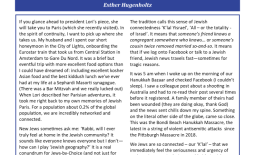The Big Idea
Never was their a more odd pairing of Torah portions than Behar-Bechukotai. To this day, Parashat Bechukotai gives me the chills with its dystopian descriptions. In fact, here’s a particular anecdote from my life that ties in with this dreaded portion: on the morning of my conversion Beit Din, I wanted to prepare myself by reading up on the coming week’s Parashah. It was Bechukotai, go figure. As I glossed over the many graphic depictions of curses, I was wondering whether this was the ‘small print’ of the contract I was about to enter into! Clearly, I was meshuggeneh enough to not let it deter me.
Since then, I’ve always had a particular fascination with this Torah portion, especially when it appears as a double portion, fraught with tension, contradiction and paradox. Behar-Bechukotai is the Dr. Jekyll and Mr. Hyde of parshiyot. Behar is full of lofty ethics. It is the portion of Shmittah, the Sabbatical Year and Yovel, the Jubilee Year in which all debts go into remission and freedom becomes the great leveler: ‘v’kidashtem et sh’nat hachamishim shnah uk’ratem d’ror ba’aretz lechol yoshveah…’ – ‘and you shall sanctify the fiftieth year and proclaim freedom throughout the land for all its inhabitants’ (Lev. 25:10). This is a Big Idea that was carried through many of the world’s political and social revolutions, etched in the Liberty Bell suspended in Philadelphia.
On the other hand, Bechukotai is harder to digest. It is all about pointing out the dire consequences if the Jewish people do not keep the terms of the covenant: the Israelites will be afflicted with plagues and fevers, be whipped up to become restless refugees, ‘as a driven leaf’, suffer starvation and engage in the darkest, most desperate taboo of cannibalism. They will live under an ‘iron sky’ and on a ‘copper earth’, grotesque curses that sound more post-industrial dystopian science fiction than ancient Biblical text.
What both parshiyot have in common, however – whether it’s the ‘carrot’ approach of Behar or the ‘stick’ approach of Bechukotai – is the idea of a Big Idea. A Big Idea is not a disembodied idea. It’s not just a flight of fancy and self-indulgent idealism. True big ideas are rooted in daily reality; in the common human experience including questions of power, responsibility, deprivation and relief. Both parshiyot go into great detail to legislate social justice and a moral order; yet the Torah never relinquishes the Big Idea in order to contend only with the minutiae. The Torah is not meant to be technocratic – the laws of the Torah are always required to point back to that essential Big Idea.
After a year of pandemic living, this notion of the Big Idea has gained particular relevance and resonance.
Last year, I preached a sermon on Behar which I had titled ‘The Great Reset’. I would like us to revisit some of the themes in that sermon and see if a year’s passing casts new light on them. I’m going to do the awkward and slightly obnoxious thing of quoting myself from last year’s sermon:
“I invite you to dream. To dream big and bold, to dream of a world that we should and could build upon the rubble of the world that we have seen collapse these last few months. A world of bold ideas and big change. A world of clean cityscapes where people for the first time in decades can see crisp, blue skies. A world where our carbon emissions can be reduced. A world of ceasefires and peace treaties. A world without war, without poverty, without authoritarianism and oppression. A world of the kind of bravery our doctors and nurses display daily on the frontlines. A world filled with the everyday kindnesses of families reconnecting at home, of friends reaching out to each other and of strangers in the public sphere. A world where we can remit debt, reorient our economic priorities, where the human spirit can flourish and human ability and need are balanced against each other. Where we extend our hand in friendship and solidarity across the globe; where we can relearn to walk the earth with gentleness. A world that will be Eden once again.”
A year on, have we made headway into these Big Ideas or are we still restrained by a lack of moral imagination? American historian and political scientist Howard Zinn had something to say about what he called a ‘bold idea’:
“The power of a bold idea uttered publicly in defiance of dominant opinion cannot be easily measured.”[1]
Judging from the shift in political realities and moral climate, I think we can take the temperature of our current moment. On the one hand, there is the undeniable impulse to ‘go back to normal’. For some of us, normal may have been comfortable, satisfying and happy. For others, normal was untenable and a moral failure. On the other hand, there is the recognition, be it centered on climate change, the balance of power between the world’s nations, the call for racial justice or the need to invest in both human and non-human infrastructure, that our time is more ready than before for Big Ideas. We need to have the insistence that a moral vision matters; that it is our values and not our nihilism that drives us. Bechukotai is an image for when we fail; Behar is an image for when we succeed.
As I was re-reading this week’s text, I was reminded of exactly why it is so compelling. But also of its treasures embedded within. Behar drafts far-reaching policy – perhaps the closest to a State of the Union address that the Torah comes. But it is actually not the policy-driven verses that caught my eye, but a far subtler one embedded in between, in chapter 25:16:
‘V’lo tonu ish v’et amito, veyareita me’eloheicha ki ani Adonai eloheichem’ – ‘Do not oppress one another; you shall fear the Eternal your God for I am the Eternal your God.’
Rashi and S’forno explain how this oppression or wronging by one another is not to be done by words, in commercial transactions between seller and buyer. This principle is called ‘ona’at devarim’, the ‘oppression through words.’ Perhaps we could apply a kal v’chomer, an a fortiori, argument here: if we are commanded not to cause harm by mere words or immaterial means, all the more so should we not cause harm by physical or material means.
This one verse is what ties both Behar and Bechukotai together; if we succeed in heeding this, then we fulfill Behar. If we fail, then we bring the ghastly, horrific vision of Bechukotai to fruition.
This past year, we have seen both. The most cruelly horrific to the most morally enduring. We have seen kindness and callousness. We have witnessed the accumulated effect of both. We have seen curses, with overflowing ICU’s and miracles, with effective vaccines. And balanced between both is the Big Idea: the proof that yes, we can offer relief to our world, that we are, in the words of Leviticus, mere ‘strangers in the land’, familiar with the precariousness of our current predicament. We are only safe inasmuch as the most vulnerable among us is safe; our country is only safe inasmuch as our world is safe. Big Ideas are not untethered from the millions of small ethical acts and individual dreams that we dream.
We can still dream of that world of the Great Reset. The greatest gift of our Torah is the gift of imagination, the blessing of boldness. We can embody that boldness at every turn in our individual lives as well as argue its case in the marketplace of ideas. We cannot afford excuses or permit delays. The time is now.
[1] Howard Zinn, You Can’t Be Neutral on a Moving Train: A Personal History of Our Times



